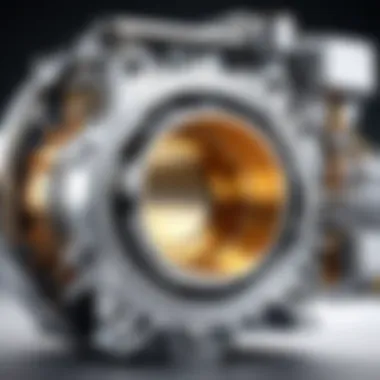Power Source Fuel Additives: Performance & Sustainability


Intro
Fuel additives are crucial in modern engine performance and environmental sustainability. As the global focus on energy efficiency grows, understanding these additives becomes increasingly important. This article will provide an in-depth look at various fuel additives, highlighting their benefits and potential impacts.
Technical Specifications
Fuel additives come in various types, each with specific technical characteristics. Understanding these specs helps in choosing the right product for particular applications.
Detailed Product Specs
Different additives are formulated to address various issues, such as cleaning fuel systems, improving combustion, and enhancing efficiency. Common specifications include:
- Chemical Composition: Determines how the additive interacts with fuel and engine components.
- Concentration Levels: Impacts the effectiveness of an additive in achieving its intended results.
Performance Metrics
Performance metrics are critical in evaluating the effectiveness of fuel additives. Key metrics include:
- Fuel Economy Improvement: Measured in miles per gallon or kilometers per liter.
- Emission Reductions: Quantified in parts per million (ppm).
- Engine Performance: Evaluated through horsepower and torque improvements.
Compatibility Information
It's important to ensure that fuel additives are compatible with engine types. Information about compatibility can often be found on product labels or manufacturer specifications. This knowledge ensures optimal functionality and minimizes risk of damage.
Product Comparisons
Understanding various fuel additives requires comparing their features, prices, and user experiences.
Feature Comparisons
Different additives offer unique features. Some are designed primarily for cleaning, while others enhance performance or reduce emissions. Understanding these features aids consumers in selecting the best product based on their needs.
Price Breakdown
Price can vary significantly based on the brand and formulation. A breakdown of costs provides insight into average pricing ranges:
- Low-end additives: Usually range from $5 to $15 per bottle.
- Mid-range options: Generally cost between $15 and $30.
- Premium products: Can exceed $30, often promising superior results.
User Experience Breakdown
Consumer reviews and experiences shape product perceptions. Analyzing user feedback can reveal patterns in satisfaction and effectiveness. Websites like reddit.com can be helpful to gather user experiences with specific products.
Practical Applications
The application of fuel additives varies widely based on user needs and engine types.
Use Cases for Different Users
- Daily Drivers: Benefit from fuel system cleaners that enhance efficiency and reduce emissions.
- Performance Enthusiasts: Seek out additives that improve horsepower and throttle response.
- Fleet Operators: May focus on cost-effective solutions that ensure long-term engine health.
Recommended Configurations
Different engines may require specific types of additives. For instance, turbocharged engines might benefit from additives designed to mitigate heat and prevent knock. It's essential to match the additive with the engine's requirements for optimal performance.
Multi-Platform Performances
Some additives are engineered to work across various platforms, including automobiles, motorcycles, and even boats. Multi-platform effectiveness can simplify product selection, especially for users with diverse vehicle types.
Latest Trends
The industry surrounding fuel additives is always evolving. Notable trends include:
Industry Developments
- Synthetic Additives: Increasingly popular due to their superior performance and stability compared to traditional additives.
- Eco-friendly Products: A shift towards greener formulations to reduce environmental impact.
Emerging Technologies
Innovations in fuel chemistry continue to emerge, leading to more effective and efficient additives that promise better engine performance and lower emissions.
Future Predictions
The market forecast suggests a continued emphasis on sustainability and efficiency, driving developments in fuel additive formulations.


Buying Guides
Navigating the fuel additive market requires careful consideration of product recommendations and purchasing tactics.
Recommended Products
While recommendations vary, it is advisable to look for established brands known for quality. Products from companies like Liqui Moly and Lucas Oil often receive positive feedback from users.
Purchasing Tips
- Look for detailed product labels that state specifications and compatibility.
- Check for third-party testing or endorsements, which can add credibility.
Warranty and Support Information
Understanding warranty terms and customer support can protect your investment. Some brands offer satisfaction guarantees, which may indicate confidence in their products.
Fuel additives play a pivotal role in enhancing engine performance while addressing ecological concerns. Their correct use can lead to improved efficiency and lower emissions.
Prelims to Power Source Fuel Additives
Fuel additives are essential compounds added to fuels to enhance their properties and optimize their performance. Understanding fuel additives is crucial in various sectors, including automotive, aviation, and marine industries. They play a significant role in improving engine efficiency and decreasing harmful emissions. These benefits contribute to a more sustainable energy future. As performance demands increase and environmental regulations tighten, the significance of fuel additives continues to grow.
Definition of Fuel Additives
Fuel additives can be defined as substances that are introduced to fuels to improve their characteristics and overall performance. These additives can serve multiple purposes, such as boosting octane levels, reducing engine wear, preventing deposits, and enhancing fuel stability. They work chemically within the fuel to achieve desired outcomes.
Common Types of Fuel Additives:
- Detergents: Keep fuel systems clean by minimizing deposits.
- Octane Boosters: Increase fuel's resistance to knocking.
- Cetane Improvers: Enhance ignition quality of diesel fuels.
- Corrosion Inhibitors: Protect engine components from rust and corrosion.
- Stabilizers: Maintain fuel quality over time.
Significance in Modern Energy Systems
Fuel additives have a critical role in modern energy systems. As global energy demands rise, there is a pressing need for fuels that deliver superior performance. Additives help achieve this by improving combustion efficiency and maximizing energy output from every drop of fuel.
Moreover, the regulatory landscape has evolved to favor cleaner fuels. Fuel additives facilitate compliance with stringent emissions standards, ensuring vehicles emit fewer pollutants. They also contribute to lowering greenhouse gas emissions, aligning with global sustainability goals.
In summary, the significance of fuel additives in modern energy systems cannot be overstated. They not only enhance engine performance but also play a vital role in promoting sustainability and environmental responsibility.
Types of Fuel Additives
Fuel additives play a crucial role in the optimization of engine performance and efficiency. They serve a variety of functions that extend beyond merely enhancing the quality of the fuel. Understanding the different types of fuel additives is key to maximizing their benefits while mitigating any potential risks involved in their usage. This section outlines the main categories of fuel additives and delves into their specific characteristics, advantages, and considerations.
Detergents
Detergents are additives designed to keep the fuel system clean. They work by preventing the formation of deposits in the engine and fuel system components. Over time, substances in fuel can lead to carbon build-up that hinders engine performance.
Using detergents can enhance fuel economy and ensure smooth operation by maintaining cleanliness. Increased engine cleanliness also leads to a reduction in emissions, aligning with environmental goals. Common detergents include polyisobutylene amine (PIBA) and di-alkyl amine (DAA).
Octane Boosters
Octane boosters raise the octane rating of fuels. Higher octane levels can prevent engine knocking, which occurs when fuel ignites prematurely. Improved octane ratings are particularly beneficial for high-performance engines that operate under greater strain.
The application of octane boosters can thus enhance overall engine performance and responsiveness. Some examples include toluene and methylcyclopentadiene, which are effective in specific fuel blends and formulations.
Cetane Improvers
Cetane improvers serve a similar purpose as octane boosters but are tailored for diesel engines. These additives increase the cetane number, which is crucial for the ignition quality of diesel fuel. A higher cetane number translates to quicker ignition and smoother combustion, leading to better engine performance.
The presence of cetane improvers can also lower emissions and enhance fuel efficiency by promoting more complete combustion. Compounds like 2-ethylhexyl nitrate are often used as cetane improvers in various diesel formulations.
Corrosion Inhibitors
Corrosion inhibitors protect engine parts and fuel systems from the damaging effects of corrosion. Fuel can absorb moisture over time, leading to rust and degradation of metal components. Corrosion inhibitors help to create a protective barrier that minimizes this risk.
The use of these additives can prolong the lifespan of engine parts and ensure reliability. Commonly used corrosion inhibitors include amine-based compounds, which can prevent rust formation and maintain engine integrity.
Stabilizers
Stabilizers play an essential role in maintaining the quality of fuels during storage. Over time, fuels can degrade due to oxidation, leading to the formation of sludge and gums that may negatively impact engine performance.
By incorporating stabilizers, fuels can retain their quality for longer periods, making them suitable for various applications. Examples of stabilizers include butylated hydroxytoluene (BHT) and phenolic compounds, which help extend the shelf life of both gasoline and diesel fuels.
Understanding various types of fuel additives and their unique benefits allows consumers to make better informed choices about fuel products that enhance performance and sustainability in energy systems.


Mechanisms of Action
Understanding the mechanisms of action for fuel additives is crucial in grasping their overall benefit to engine performance and sustainability. These mechanisms dictate how additives influence fuel behavior and combustion processes, ultimately impacting efficiency and emissions. By discussing their chemical properties and interactions with fuel components, this section will provide insights into how effectively these additives function in real-world applications.
Chemical Properties at Work
Fuel additives possess distinct chemical properties that enable them to deliver optimized performance. For instance, the molecular structure of these substances determines their compatibility with various fuels. Additives like detergents and stabilizers often contain polar functional groups, which enhance solubility in hydrocarbon mediums. This solubility is vital for reducing deposit formation within the engine, ensuring cleaner combustion.
Chemical properties can also influence:
- Viscosity: An additive's impact on fuel viscosity can improve flow characteristics, especially in cold conditions.
- Flash Point: A change in this property can enhance safety during storage and use.
Careful formulation ensures that the additives remain effective across a range of temperatures and operational conditions. Proper understanding of these properties allows for a tailored approach in enhancing fuel characteristics, improving overall energy efficiency.
Interaction with Fuel Components
The interaction between fuel additives and the various components of fuel is pivotal for maximizing efficiency and performance. These interactions can be categorized into a few key areas:
- Combustion Process Enhancement: Additives can alter the combustion characteristics of fuel, leading to a more complete burn. This results in increased power output and reduced emissions.
- Preventing Degradation: Components in fuel can degrade over time, particularly under heat and pressure. Additives like stabilizers slow this degradation process, ensuring fuel remains effective for longer periods.
- Contaminant Mitigation: By improving the solubility of particulates, some additives prevent them from forming harmful deposits or sludge in the engine. This directly contributes to smoother operation and longevity of engine components.
Proper interactions between additives and fuel components are essential for ensuring optimized performance and environmental compliance.
In summary, the mechanisms of action that fuel additives employ play a significant role in ensuring that engines run efficiently while adhering to sustainability standards. Understanding both their chemical properties and interactions with fuel components provides the necessary groundwork for appreciating their benefits and potential risks.
Benefits of Fuel Additives
Fuel additives play a crucial role in modern combustion engines. By enhancing performance and sustainability, they are integral to achieving optimal energy efficiency. The benefits of these additives go beyond mere function; they affect the entire lifecycle of engine performance and fuel consumption. In this section, we will explore several key advantages that fuel additives offer, which are essential for both manufacturers and users.
Enhanced Engine Performance
One of the primary purposes of fuel additives is to improve engine performance. These additives ensure that the fuel burns more completely in the combustion chamber. A clean burn leads to higher power output per unit of fuel. This is especially noticeable in high-performance vehicles where maximum efficiency is desired. Additives like detergents keep the engine's internal components clean by preventing deposits from forming. Less buildup means not only better performance but also fewer maintenance requirements, ultimately saving costs.
Key advantages of enhanced engine performance include:
- Increased horsepower: Engines can respond more rapidly to acceleration requests.
- Smooth operation: Reduces rough idling and engine knock.
- Shorter warm-up times: Less time requires achieving optimal operating temperatures.
Improved Fuel Efficiency
Another significant benefit of fuel additives is their potential to improve fuel efficiency. Fuel additives can optimize the chemical structure of the fuel. This leads to a better combustion process. For consumers, this means using less fuel for the same distance traveled, leading to cost savings. Improved fuel economy also contributes to less dependency on fossil fuels, which aligns with global sustainability goals. Simply put, better fuel efficiency translates to fewer resources consumed per journey.
Aspects of improved fuel efficiency:
- Cost savings: Lower fuel expenses can make a considerable difference over time.
- Extended travel range: Fewer stops at the gas station increase convenience.
Reduction of Emissions
Fuel additives also contribute to environmental sustainability. By facilitating cleaner combustion, these additives help reduce harmful emissions. This aligns well with the increasing regulations on vehicle emissions and environmental standards. Cleaner exhaust promotes not only reduced pollutants but also less harm to public health. This benefit is particularly crucial in urban areas where air quality can significantly impact residents' health.
Benefits of reduced emissions:
- Lower greenhouse gases such as carbon dioxide.
- Reduced particulate matter, improving air quality.
Longevity of Engine Components
The use of fuel additives can lead to a longer lifespan for engine components. Corrosion inhibitors present in certain fuel additives help guard against wear and tear caused by fuel contaminants. By maintaining clean fuel lines and injectors, these additives prolong engine life. This results in fewer repairs and replacements, benefiting consumers economically and reducing waste.
Longevity benefits include:
- Less frequent repairs: Save on maintenance costs and downtime.
- Better trade-in value: Well-maintained engines often yield higher resale prices.
In summary, the benefits of fuel additives extend beyond basic functionality. From improved engine performance and fuel efficiency to reduced emissions and enhanced durability of components, these additives play a pivotal role in modern engine technology. The importance of these factors cannot be underestimated in today’s push for efficiency and sustainability.
Potential Risks and Considerations
Understanding the potential risks and considerations associated with power source fuel additives is crucial. While additives can significantly improve engine performance and fuel efficiency, there are several factors to evaluate before employing them. Ignoring these considerations may lead to compatibility issues, environmental impacts, and regulatory hurdles. Discussing these risks ensures that consumers make informed decisions when choosing fuel additives for their vehicles or equipment.
Compatibility Issues with Engines
One of the primary concerns with fuel additives is their compatibility with various engine types. Not all additives are suitable for every engine; some may even cause damage. For instance, certain detergents can react negatively with older engines or those designed for specific fuel types. Engine manufacturers often specify acceptable additives in their guidelines. Using the wrong additive can lead to:
- Reduced Engine Efficiency: Inappropriate additives can hinder an engine’s performance.
- Increased Wear and Tear: Some chemicals may accelerate wear on components, causing premature failures.
- Formation of Deposits: Certain additives can lead to the buildup of harmful deposits, affecting combustion and power output.
Prior research and careful selection are key. Always consult with the manufacturer to ensure compatibility.


Environmental Impacts
The environmental implications of using fuel additives cannot be overlooked. While some additives are designed to minimize emissions, others may have the opposite effect. For example, octane boosters can enhance performance but may release harmful pollutants into the atmosphere. The following points highlight the environmental considerations:
- Emissions: Not all additives reduce exhaust emissions effectively. Some contribute to higher concentrations of nitrogen oxides and particulate matter.
- Biodegradability: Additives that are not biodegradable can contaminate soil and water. Manufacturers are increasingly focusing on sustainable options, but caution is still warranted.
- Additive Production Impact: The manufacturing process for certain chemicals can lead to environmental degradation, such as habitat destruction or pollution.
Using environmentally friendly additives can alleviate some of these concerns, but awareness and research are vital.
Regulatory Challenges
Regulatory issues add another layer of complexity. Different countries have distinct regulations governing the use of fuel additives. This can pose challenges for consumers and manufacturers alike. Key regulatory concerns include:
- Compliance with Standards: Additives must meet specified performance and safety standards. Non-compliance can result in fines or product recalls.
- Testing Requirements: New additives frequently undergo extensive testing, which can delay market availability and increase costs.
- Changing Regulations: Regulations can evolve, impacting existing products and formulations. Staying current with changes is crucial for consumers and manufacturers.
In summary, while fuel additives offer notable benefits, understanding the potential risks is essential. Compatibility with engines, environmental footprint, and compliance with regulations must all be considered to ensure effective and responsible usage.
Market Trends in Fuel Additives
The landscape of power source fuel additives is rapidly evolving. Understanding current market trends is critical for stakeholders. Knowledge of these trends provides insights into consumer preferences and industry shifts. Fuel additives not only enhance performance but also address sustainability concerns. Therefore, keeping abreast of market dynamics is essential for manufacturers and consumers alike.
Growth Drivers and Market Demand
Several factors contribute to the growth of the fuel additives market. Increasing vehicle production and rising energy demands are significant drivers. The automotive industry needs fuel additives to meet stringent emission regulations. These regulations push for cleaner fuels and better engine performance.
Moreover, environmental awareness is rising among consumers. People are seeking ways to minimize their carbon footprints. As a result, there is a greater demand for sustainable fuel solutions. This demand influences manufacturers to innovate and offer eco-friendly products.
Key growth drivers include:
- Regulatory Changes: Government regulations decrease emissions and enhance fuel quality.
- Technological Advancements: Innovations lead to more effective and efficient fuel additives.
- Consumer Preferences: More consumers are interested in sustainable and high-performance products.
Technological Innovations
The fuel additives market is being shaped by ongoing technological advancements. Research and development play a crucial role in product innovation. These innovations often focus on improving performance and reducing environmental impact.
For instance, new formulations are being created that are more efficient. These formulations provide better fuel economy and lower emissions. Additionally, advancements in nanotechnology are enhancing the effectiveness of fuel additives. Such technologies lead to increased longevity of engine components.
Significant technological innovations include:
- Nanotechnology Applications: Improved performance through better fuel atomization.
- Bio-based Additives: Sustainable options made from renewable resources.
- Advanced Testing Methods: More precise assessments of additive performance.
The ongoing development in fuel additives reflects a commitment to meeting contemporary challenges.
By understanding these trends and innovations, stakeholders can make informed decisions. This knowledge aids in selecting the right fuel additives to optimize engine performance while adhering to environmental standards.
Commercial Applications of Fuel Additives
The application of fuel additives spans various industries, establishing their importance in enhancing performance and sustainability. Fuel additives are vital in optimizing engine efficiency and reducing emissions across multiple sectors. As energy demands grow and environmental regulations tighten, the role of these additives becomes increasingly paramount.
Automotive Industry
In the automotive sector, fuel additives serve multiple functions. They help to maintain engine cleanliness, improve combustion efficiency, and reduce harmful emissions. Detergent additives clean fuel injectors and intake valves, preventing deposits that can degrade performance over time. Furthermore, octane boosters enhance fuel quality, allowing for more efficient combustion, leading to increased horsepower and better fuel economy.
Additionally, fuel additives designed for corrosion inhibition protect critical engine components. Vehicles, especially those operating in harsh environments, benefit immensely from these additives, ensuring durability and reliability. Understanding the composition of these products is vital for consumers looking to enhance their vehicle's performance.
Aviation Sector
The aviation industry has unique demands that fuel additives must meet. Jet fuel often requires specific additives to enhance performance and safety. Anti-icing agents, for instance, are crucial in preventing ice formation in fuel lines and tanks, a significant hazard for flight safety. Moreover, additives improve fuel stability, minimizing degradation during extended storage periods.
Another area of concern is reducing emissions from aircraft engines. Components like biocides are added to combat microbial growth in fuel tanks, ensuring that fuel remains uncontaminated and performance is upheld during flights. The complexities of aviation fuel additives reflect the industry's stringent safety standards and operational demands.
Marine Applications
Marine applications for fuel additives focus on efficiency and environmental impact. Ships often consume large quantities of fuel, making even small improvements in efficiency significant. Fuel stabilizers are among the most used additives, ensuring that fuel maintains its integrity during long voyages. They prevent the formation of varnish and sludge, common issues in marine fuels.
Additionally, biodegradable additives have gained attention in this sector. These products aim to reduce the ecological footprint of the shipping industry by breaking down in the environment, highlighting the commitment to sustainability.
Fuel additives in marine applications are integral for compliance with environmental regulations and in promoting overall operational efficacy.
Fuel additives have become essential in many industries. They not only enhance performance but also help meet stringent regulations aimed at reducing the environmental impact of fuel consumption.
The End
The conclusion of this article encapsulates the multifaceted role that power source fuel additives play in modern energy systems. It’s crucial to recognize their significance not only in enhancing the performance of engines but also in fostering sustainability. Fuel additives optimize combustion, improve fuel efficiency, and contribute to lowering harmful emissions. In an era where environmental concerns are becoming increasingly pertinent, the potential for fuel additives to maintain engine longevity while mitigating environmental impacts cannot be overstated.
Summary of Findings
Throughout this discussion, several key points emerged regarding fuel additives. Their types—such as detergents, cetane improvers, and stabilizers—each serve distinct but essential functions. The chemical mechanisms at play show how these additives influence fuel properties. Benefits, like enhanced engine performance and improved efficiency, directly correlate with their usage. However, one must also consider compatibility issues and regulatory challenges that accompany the application of these additives. Critical examination of these aspects ensures that consumers and industry stakeholders can maximize the advantages while minimizing risks.
Future Projections for Fuel Additive Usage
Looking ahead, the future of fuel additives appears promising but complex. As technology advances, we can anticipate innovations in formulation, leading to even more effective products. Research focusing on sustainable and eco-friendly alternatives is likely to flourish. The demand for high-performance engines in automotive and aviation sectors will drive market growth. However, emerging regulations may pose new challenges that require adaptive strategies. A balanced approach will be critical to harness the full potential of fuel additives in a manner that aligns with global sustainability goals.







